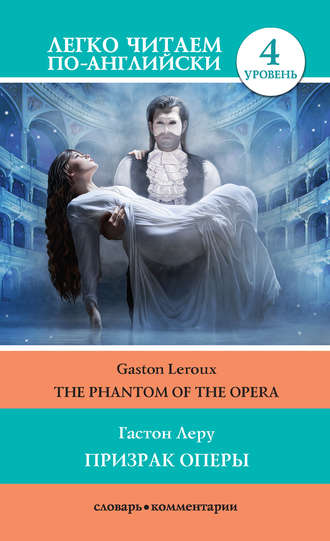
Гастон Леру
Призрак оперы / The Phantom of the Opera
Chapter II
On the first landing[21], Sorelli met the Comte de Chagny, who was coming upstairs. The count, who was generally so calm, seemed greatly excited.
“I was just going to you,” he said, taking off his hat. “Oh, Sorelli, what an evening! And Christine Daae: what a triumph!”
“Impossible!” said Meg. “Six months ago, she used to sing awfully! But, my dear count, we are going to inquire after a poor man who was found hanging by the neck.”
They all went on to the foyer of the ballet[22], which was already full of people. The Comte de Chagny was right. The real triumph was reserved for Christine Daae, who had begun by singing a few passages from Romeo and Juliet. No one had ever heard or seen anything like it.
Everybody went mad, shouting, cheering, clapping, while Christine sobbed and fainted in the arms of her fellow-singers and had to be carried to her dressing-room.
The Comte de Chagny was loudly applauding. Philippe de Chagny was just forty-one years old. He was a great aristocrat and a good-looking man, with attractive features, in spite of his hard forehead and his rather cold eyes. He was exquisitely polite to the women and a little haughty to the men, who did not always forgive him for his successes in society. On the death of old Count Philibert[23], he became the head of one of the oldest and most distinguished families in France.
The Chagnys owned a great deal of property; and, when the old count, who was a widower, died, it was no easy task for Philippe to accept the management of so large an estate. His two sisters and his brother, Raoul[24], would not hear of a division, leaving themselves entirely in Philippe’s hands. When the two sisters married, on the same day, they received their portion from their brother—as a dowry for which they thanked him.
The Comtesse de Chagny, had died in giving birth to Raoul, who was born twenty years after his elder brother. At the time of the old count’s death, Raoul was twelve years of age. Philippe gave young Raoul a taste for the sea. The lad finished his course with honors and made his trip round the world. He had just been appointed a member of the official expedition, which was to be sent to the Arctic Circle. Meanwhile, he was enjoying a long furlough.
The shyness of the lad—I was almost saying his innocence—was remarkable. He was petted by his two sisters and his old aunt. He was a little over twenty-one years of age and looked eighteen. He had a small, fair mustache, beautiful blue eyes and a complexion like a girl’s.
Philippe was very proud of Raoul and pleased to foresee a glorious career for his junior in the navy in which one of their ancestors had held the rank of admiral. Philippe wanted to show him Paris, with all its luxurious and artistic delights. Philippe himself had a character that was very well-balanced in work and pleasure alike; and he was incapable of setting his brother a bad example. He took him with him wherever he went. He even introduced him to the foyer of the ballet.
On that evening, Philippe, after applauding the Daae, turned to Raoul and saw that he was quite pale.
“Don’t you see,” said Raoul, “that the woman’s fainting?”
“You look like fainting yourself,” said the count. “What’s the matter?”
But Raoul had recovered himself and was standing up.
“Let’s go and see,” he said, “she never sang like that before.”
The count gave his brother a curious smiling glance and seemed quite pleased. They were soon at the door leading to the stage. Raoul tore his gloves without knowing what he was doing.
They reached the stage. Raoul was leading the way, feeling that his heart no longer belonged to him. Count Philippe followed him with difficulty and smiled. The count was surprised to find that Raoul knew the way. He had never taken him to Christine’s himself and came to the conclusion that Raoul must have gone there alone while the count stayed talking in the foyer with Sorelli.
Postponing his usual visit to Sorelli for a few minutes, the count followed his brother down the passage that led to Daae’s dressing-room and saw that it had never been so crammed as on that evening, when the whole house seemed excited by her success. The doctor of the theater had just arrived at the moment when Raoul entered. Christine opened her eyes. The count and many more remained crowding in the doorway.
“Don’t you think, Doctor, that those gentlemen had better clear the room?” asked Raoul coolly. “There’s no breathing here.”
“You’re quite right,” said the doctor.
And he sent every one away, except Raoul and the maid, who looked at Raoul with eyes of the most undisguised astonishment. She had never seen him before and yet dared not question him; and the doctor imagined that the young man was only acting as he did because he had the right to. The viscount, therefore, remained in the room watching Christine as she slowly returned to life, while even the joint managers, Debienne and Poligny, who had come to offer their sympathy and congratulations, found themselves thrust into the passage among the crowd of dandies. The Comte de Chagny laughed.
He turned to go to Sorelli’s dressing-room, but met her on the way, with her little troop of trembling ballet-girls, as we have seen.
Meanwhile, Christine Daae uttered a deep sigh, which was answered by a groan. She turned her head, saw Raoul and started. She looked at the doctor, on whom she bestowed a smile, then at her maid, then at Raoul again.
“Monsieur,” she said, “who are you?”
“Mademoiselle,” replied the young man, kneeling on one knee and pressing a fervent kiss on the diva’s hand, “I am the little boy who went into the sea to rescue your scarf.”
Christine again looked at the doctor and the maid; and all three began to laugh.
Raoul turned very red and stood up.
“Mademoiselle,” he said, “since you are pleased not to recognize me, I should like to say something to you in private, something very important.”
“When I am better, do you mind?” And her voice shook.
“Yes, you must go,” said the doctor, with his pleasantest smile. “Leave me to attend to mademoiselle.”
“I am not ill now,” said Christine suddenly, with strange and unexpected energy.
She rose and passed her hand over her eyelids.
“Thank you, Doctor. I should like to be alone. Please go away, all of you. Leave me. I feel very restless this evening.”
The doctor tried to make a short protest, but he thought the best remedy was not to thwart her.
And he went away, saying to Raoul, outside:
“She is not herself tonight. She is usually so gentle.”
Then he said good night and Raoul was left alone. This part of the theater was now deserted. Raoul felt a terrible pain at his heart and he wanted to speak to Daae without delay.
Suddenly the dressing-room door opened and the maid came out, carrying bundles. He stopped her and asked how her mistress was. The woman laughed and said that she was quite well, but that he must not disturb her, for she wished to be left alone. And she passed on. One idea filled Raoul’s burning brain: of course, Daae wished to be left alone for him! Had he not told her that he wanted to speak to her privately?
Hardly breathing, he went up to the dressing-room and, with his ear to the door to catch her reply, prepared to knock. But his hand dropped. He had heard a man’s voice in the dressing-room:
“Christine, you must love me!”
And Christine’s voice, infinitely sad and trembling, as though accompanied by tears, replied:
“How can you talk like that? When I sing only for you!”
Raoul leaned against the panel to ease his pain. His heart, which had seemed gone for ever, returned to his breast and was throbbing loudly. Surely, if his heart continued to make such a noise, they would hear it inside, they would open the door and the young man would be turned away in disgrace. What a position for a Chagny! To be caught listening behind a door!
The man’s voice spoke again: “Are you very tired?”
“Oh, tonight I gave you my soul and I am dead!” Christine replied.
“Your soul is a beautiful thing, child,” replied the grave man’s voice, “and I thank you. No emperor ever received so fair a gift. The angels wept tonight.”
Raoul heard nothing after that. Nevertheless, he did not go away, but he went to the dark corner, determined to wait for the man to leave the room. At one and the same time, he had learned what love meant, and hatred. He knew that he loved. He wanted to know whom he hated. To his great astonishment, the door opened and Christine Daae appeared, wrapped in furs, with her face hidden in a lace veil, alone. She closed the door behind her, but Raoul observed that she did not lock it. She passed him. He did not even follow her with his eyes, for his eyes were fixed on the door, which did not open again.
When the passage was once more deserted, he crossed it, opened the door of the dressing-room, went in and shut the door. He found himself in absolute darkness.
“There is some one here!” said Raoul, with his back against the closed door, in a quivering voice. “What are you hiding for?”
All was darkness and silence. Raoul heard only the sound of his own breathing.
“You shan’t leave this until I let you!” he exclaimed. “If you don’t answer, you are a coward! But I’ll see you!”
And he struck a match. The blaze lit up the room. There was no one in the room! He went into the dressing-closet, opened the cupboards, hunted about. Nothing!
“Look here!” he said, aloud. “Am I going mad?”
He went out, not knowing what he was doing nor where he was going. He found himself at the bottom of a staircase, down which, behind him, a procession of workmen were carrying a sort of stretcher, covered with a white sheet.
“Which is the way out, please?” he asked of one of the men.
“Straight in front of you, the door is open. But let us pass.”
Pointing to the stretcher, he asked mechanically: “What’s that?”
The workmen answered:
“‘That’ is Joseph Buquet, who was found in the third cellar, hanging between a farm-house and decorations.”
He took off his hat and went out.
Chapter III
During this time, the farewell ceremony was taking place. This ceremony was being given on the occasion of the retirement of M. Debienne and M. Poligny. All these people met, after the performance, in the foyer of the ballet, where Sorelli waited for the arrival of the retiring managers with a glass of champagne in her hand and a little prepared speech at the tip of her tongue. Behind her, the members of the Corps de Ballet[25], young and old, discussed the events of the day in whispers or exchanged discreet signals with their friends, a noisy crowd of whom surrounded the supper-tables.
Little Jammes seemed already to have forgotten the ghost and the death of Joseph Buquet. She never ceased to laugh and chatter, to hop about and play jokes.
Everybody remarked that the retiring managers looked cheerful. All were already smiling broadly upon Sorelli, who had begun to recite her speech, when an exclamation from that little Jammes broke the smile of the managers brutally:
“The Opera ghost!”
Jammes yelled these words in a tone of unspeakable terror; and her finger pointed, among the crowd of dandies, to a face so pallid, so lugubrious and so ugly, with two such deep black cavities under the straddling eyebrows, that the death’s head immediately scored a huge success.
“The Opera ghost! The Opera ghost!”
Everybody laughed and pushed his neighbor and wanted to offer the Opera ghost a drink, but he was gone. He had slipped through the crowd; and the others vainly hunted for him, while two old gentlemen tried to calm little Jammes.
Sorelli was furious; she had not been able to finish her speech; the managers, had kissed her, thanked her and run away as fast as the ghost himself. No one was surprised at this, for it was known that they were to go through the same ceremony on the floor above, in the foyer of the singers, and in the great lobby a regular supper would be served.
Here they found the new managers, M. Armand Moncharmin and M. Firmin Richard[26], whom they hardly knew. The retiring managers handed over to their successors the two tiny master-keys which opened all the doors—thousands of doors—of the Opera house. And those little keys, the object of general curiosity, were being passed from hand to hand, when the attention of some of the guests was diverted by their discovery, at the end of the table, of that strange, wan and fantastic face, with the hollow eyes, which had already appeared in the foyer of the ballet and been greeted by little Jammes’ exclamation:
“The Opera ghost!”
There sat the ghost. He neither ate nor drank. He did not speak a word.
What happened was this: Mm. Debienne and Poligny, sitting at the center of the table, had not seen the man with the death’s head. Suddenly he began to speak.
“The ballet-girls are right,” he said. “The death of that poor Buquet is perhaps not so natural as people think.”
“Is Buquet dead?” Debienne and Poligny cried.
“Yes,” replied the man, or the shadow of a man, quietly. “He was found, this evening, hanging in the third cellar.”
The two managers, or rather ex-managers, at once rose and stared strangely at the speaker. They were more excited than any one need be by the announcement of the suicide of a chief scene-shifter. They looked at each other. They had both turned whiter than the table-cloth. At last, Debienne made a sign to Mm. Richard and Moncharmin; Poligny muttered a few words of excuse to the guests; and all four went into the managers’ office. I leave M. Moncharmin to complete the story. In his Memoirs, he says:
“Mm. Debienne and Poligny appeared to have something very difficult to tell us. First, they asked us if we knew the man, sitting at the end of the table, who had told them of the death of Joseph Buquet; and we answered in the negative. They took the master-keys from our hands, stared at them for a moment and advised us to have new locks made. They said this so funnily that we began to laugh and to ask if there were thieves at the Opera. They replied that there was something worse, which was the ghost. We began to laugh again. They told us that they never would have spoken to us of the ghost, if they had not received formal orders from the ghost himself to ask us to be pleasant to him and to grant any request that he might make. The announcement of the death of Joseph Buquet had served them as a brutal reminder that some fantastic or disastrous event had brought them to a sense of their dependence.
“Richard asked half-seriously and half in jest:
‘But, after all, what does this ghost of yours want?’
M. Poligny went to his desk and returned with a copy of the memorandum-book[27]. The copy produced by M. Poligny was written in black ink and exactly similar to that in our possession, except that, at the end, it contained a paragraph in red ink and in a queer handwriting. This paragraph ran, word for word, as follows:
“‘5. If the manager, in any month, delays for more than a fortnight the payment of the allowance which he shall make to the Opera ghost, an allowance of twenty thousand francs a month, say two hundred and forty thousand francs a year.’
M. Poligny pointed with a hesitating finger to this last clause, which we certainly did not expect.
‘Is this all? Does he not want anything else?’ asked Richard, with the greatest coolness.
‘Yes, he does,’ replied Poligny.
And he turned over the pages of the memorandum-book until he came to the clause:
‘Box Five on the grand tier shall be placed at the disposal of the Opera ghost for every performance.’
‘So you see, two hundred and forty thousand francs are not nothing,’ said M. Poligny. ‘And have you considered what the loss over Box Five meant to us? It’s awful! We really can’t work to keep ghosts! We prefer to go away!’





